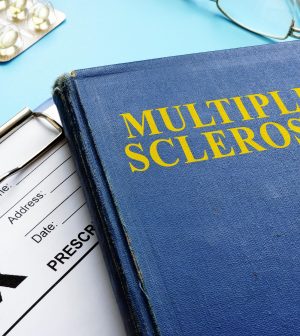- Could Your Grocery Store Meat Be Causing Recurring UTIs?
- Are You Making This Expensive Thermostat Error This Winter?
- Recognizing the Signs of Hypothyroidism
- 10 Strategies to Overcome Insomnia
- Could Artificial Sweeteners Be Aging the Brain Faster?
- Techniques for Soothing Your Nervous System
- Does the Water in Your House Smell Funny? Here’s Why
- Can a Daily Dose of Apple Cider Vinegar Actually Aid Weight Loss?
- 6 Health Beverages That Can Actually Spike Your Blood Sugar
- Treatment Options for Social Anxiety Disorder
Scientists May Understand Link Between Common Virus & Multiple Sclerosis

It’s been known for years that Epstein-Barr virus can trigger multiple sclerosis or drive progression of the degenerative disease, and Swedish researchers think they now understand why.
Some people have antibodies against the common Epstein-Barr virus that mistakenly attack a protein found in the brain and spinal cord, researchers at the Karolinska Institute in Sweden say.
Antibodies that bind to a specific protein in the virus, EBNA1, also are capable of binding to a similar protein in the brain and spinal cord called CRYAB, researchers learned by analyzing blood samples from more than 700 patients with MS.
These misdirected antibodies can damage the nervous system and cause severe symptoms in MS patients, including problems with balance, mobility and fatigue, researchers believe.
“MS is an incredibly complex disease, but our study provides an important piece in the puzzle and could explain why some people develop the disease,” said co-lead author Olivia Thomas, a postdoctoral researcher in the Department of Clinical Neuroscience.
“We have discovered that certain antibodies against the Epstein-Barr virus, which would normally fight the infection, can mistakenly target the brain and spinal cord and cause damage,” she said in an institute news release.
The antibodies were present in about 23% of MS patients compared to just 7% of a group of 700 healthy people, the study found.
“This shows that, whilst these antibody responses are not required for disease development, they may be involved in disease in up to a quarter of MS patients,” Thomas said.
Epstein-Barr, a herpesvirus, is one of the most widespread viruses in humans. More than 90% of the world’s population is infected and carries the virus for life, usually as a latent infection with no symptoms, researchers said in background notes.
Increasing scientific evidence has suggested that infection precedes MS, and that antibodies against the virus may be involved. However, the mechanism by which this occurs seems to vary between patients and remain largely unknown.
The researchers also found that there is likely a similar cross-reactivity among T cells of the immune system, potentially offering another pathway through which having Epstein-Barr can lead to MS.
“We are now expanding our research to investigate how T cells fight EBV infection and how these immune cells may damage the nervous system in multiple sclerosis and contribute to disease progression,” co-lead author Dr. Mattias Bronge, an affiliated researcher at the institute’s Department of Clinical Neuroscience, said in the release.
The new study was published May 17 in the journal Science Advances.
More information
The Harvard T.H. Chan School of Public Health has more about Epstein-Barr virus and multiple sclerosis.
SOURCE: Karolinska Institute, news release, May 17, 2023
Source: HealthDay
Copyright © 2026 HealthDay. All rights reserved.










